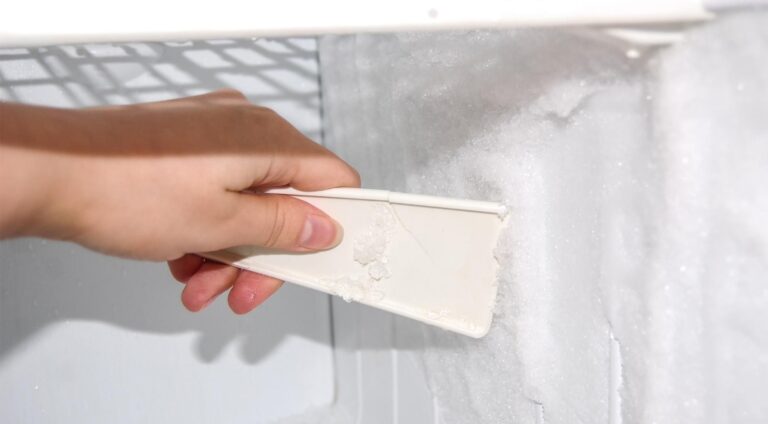You open the freezer and see a thick layer of ice covering your food. A familiar sight, isn’t it? Many homemakers face the problem of frost buildup in their freezers, but not everyone fully understands why defrosting a refrigerator is necessary. This procedure is not just a whim — it’s a must!
Today, we’ll take a closer look at why defrosting your refrigerator is so important, how frost buildup can be harmful, and what negative consequences can arise if you ignore this simple yet essential maintenance task. You’ll also learn whether No Frost refrigerators need defrosting and how this process extends the lifespan of your appliance while helping you save on electricity and household expenses.

What Is Frost and Why Does It Form in a Refrigerator?
Before discussing the importance of defrosting, let’s understand where frost comes from. The main reason for ice formation in the freezer is humid air entering when you open the door. When moisture contacts the cold walls, it condenses and settles as frost. Over time, frost turns into ice, forming a thick layer that stubbornly builds up on the walls and food.
This frost formation process is entirely natural in refrigerators with manual or drip defrosting systems. Even modern No Frost models can accumulate a small amount of frost, although in much smaller quantities.
Serious Consequences of Frost Buildup in Your Refrigerator
Many people think that frost in the freezer is just a minor inconvenience that doesn’t affect the appliance’s performance. However, this is a misconception. Ice buildup leads to several negative effects and problems:
- Reduced Cooling Efficiency:
A thick layer of ice acts as an insulator, preventing proper air circulation and reducing the cooling efficiency of your food. Your refrigerator may not freeze properly, even when running at full power. - Increased Energy Consumption:
To compensate for poor heat exchange due to the „ice coat“, the refrigerator has to work harder. The compressor runs more frequently and for longer periods to maintain the desired temperature. This leads to higher electricity bills. - Decreased Storage Space:
Frost takes up valuable space inside the freezer, reducing the available volume for food storage. Instead of using the freezer to its full potential, you are forced to store fewer products due to ice buildup. - Increased Compressor Load and Risk of Breakdowns:
Constant overworking due to ice buildup accelerates compressor wear. The compressor is the „heart“ of your refrigerator, and repairing or replacing it can be costly. Ignoring defrosting increases the risk of breakdowns and shortens the lifespan of your appliance. - Worsened Food Storage Conditions:
Unstable temperatures caused by frost buildup can lead to temperature fluctuations inside the compartments. This negatively impacts food preservation, especially in the freezer, where a stable freezing temperature is crucial.
Debunking Myths:
Do No Frost Refrigerators Need Defrosting?
Many owners of modern No Frost refrigerators believe that defrosting is only necessary for outdated models. A common myth suggests that No Frost refrigerators never need defrosting. This is not entirely true.
The No Frost system significantly reduces frost buildup by circulating air, but it does not completely eliminate moisture. A small amount of frost can still appear, especially in humid conditions or when the door is frequently opened.
Additionally, even if no visible ice forms, periodic defrosting of a No Frost refrigerator can be beneficial for hygienic cleaning and removing potential odors that may accumulate over time. Preventive defrosting also helps check and clean the drainage system to prevent blockages.
So, while No Frost refrigerators don’t require defrosting as frequently as manual defrost models, an occasional defrost (about once a year) is still recommended for optimal performance.

The Benefits of Defrosting Your Refrigerator:
The Advantages Are Clear!
Now that we understand the consequences of frost buildup, let’s summarize the key benefits of regular defrosting:
- Extended Appliance Lifespan:
Regular defrosting reduces strain on the compressor and cooling system, prolonging the refrigerator’s lifespan and delaying the need for costly repairs or replacements. - Lower Energy Bills:
A frost-free refrigerator operates more efficiently and consumes less electricity, helping you save on energy costs throughout the year. - Maximized Freezer Space:
Defrosting removes ice buildup, freeing up space in the freezer for more food storage. - Better Food Preservation:
A stable temperature after defrosting ensures better food storage and prevents premature spoilage. - Elimination of Unpleasant Odors:
Defrosting and cleaning the refrigerator help remove unpleasant smells that can accumulate over time.
Conclusion
Why should you remove frost from your refrigerator? The answer is clear: to ensure its longevity, efficiency, and cost-effectiveness! Defrosting your refrigerator isn’t a myth — it’s a necessity, backed by both technical factors and practical benefits for you and your budget.
Don’t ignore this simple yet crucial maintenance task!
Regular defrosting is the key to a healthy refrigerator and long-term savings.
In our next article, we’ll guide you through step-by-step instructions on how to properly defrost different types of refrigerators — manual, drip, and No Frost!
Did you like this article and find it helpful? Share the link with your friends!
- Published on





